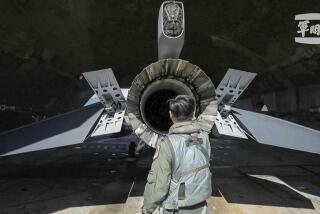Clinton Offers Aid to Muslim-Croat Army
- Share via
WASHINGTON — President Clinton announced Tuesday that he is ready to provide military equipment and training to Bosnia’s joint Muslim-Croat army after months of delay over the Bosnian federation’s failure to combine the two forces and expel Iranian militiamen.
The announcement came hours after the Bosnian federation’s parliament, under pressure from Washington, passed landmark legislation formally uniting the Bosnian Muslim and Bosnian Croat armies and setting up a joint command structure to run the force.
Two weeks ago, Clinton said he was satisfied that the federation had met a second allied demand--that it expel hundreds of Islamic militiamen, mainly Iranians, who Washington feared might threaten NATO-led peacekeeping troops on duty in the country.
White House officials said the United States will take the first step toward putting the military program into effect by sending Bosnia-Herzegovina $100 million worth of U.S. war materiel. The initial shipments are expected within a few days.
Later this week, MPRI, a firm made up of former American military officers based in Alexandria, Va., is to sign a contract for managing the program in Bosnia. Officials said training could begin in three or four weeks.
The company, rather than the U.S. military, will oversee the program because Washington wants to avoid the impression that the effort is a U.S. government undertaking. Washington officials fear that U.S. military involvement could prompt Serbs to retaliate against American troops.
The U.S.-led effort, known informally as “equip and train,” is designed to help achieve military balance in the region in hopes of dissuading the better equipped Bosnian Serbs from rekindling the factional fighting once the North Atlantic Treaty Organization-led peacekeeping troops leave early in 1997.
Besides the $100 million worth of gear, U.S. officials have received pledges for aid or equipment amounting to about $140 million from U.S. allies, including Saudi Arabia, Kuwait, Egypt and Turkey.
The equipment is expected to include small arms and ammunition, armored personnel carriers, tanks, light antitank weapons and utility helicopters. The Bosnian Serbs already have abundant supplies of such weapons.
The equip-and-train program has been controversial from the start. European governments, wary of sending more weapons into the country, have been conducting formal arms reduction talks in hopes of persuading all three Bosnian factions to give up some of their guns.
However, Clinton administration officials have warned that the talks alone are unlikely to yield results that would prevent renewal of the fighting and have been pressing to try to reduce the Bosnian Serb advantage by arming the Muslims and Croats.
To the administration’s embarrassment, the effort has been stymied by several factors. U.S. officials were unable to win the support they had sought from European allies. Later on, the Muslim-Croat federation delayed fulfillment of the two conditions attached to the equip-and-train effort.
Over the last several weeks, the administration has mounted a full-court press to get both conditions fulfilled. Several Cabinet officers and other top U.S. officials streamed into Sarajevo, the Bosnian capital, to press both factions to meet the requirements.
Although the administration has said it is satisfied with the expulsion of the Iranians, reports from the region have hinted that many moujahedeen, as the fighters are known, may still be in place and that Washington’s approval may have been premature.
More to Read
Sign up for Essential California
The most important California stories and recommendations in your inbox every morning.
You may occasionally receive promotional content from the Los Angeles Times.













